 W
W50 Reasons People Give for Believing in a God is a 2008 book by journalist Guy P. Harrison which examines fifty common reasons that believers across the world give for believing in a god or gods.
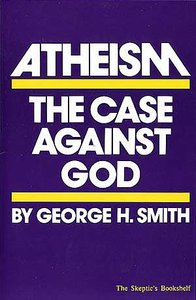 W
WAtheism: The Case Against God is a 1974 book by George H. Smith, in which the author argues against theism and for atheism.
 W
WAtheist Manifesto: The Case Against Christianity, Judaism, and Islam is a 2005 book by French author Michel Onfray. According to Onfray, the term "athéologie" is taken from a project of a series of books written and compiled by Georges Bataille under the vocable La Somme athéologique, which was ultimately never completed.
 W
WAtheist Mind, Humanist Heart: Rewriting the Ten Commandments for the Twenty-first Century is a 2014 book by Lex Bayer and Humanist Chaplain, John Figdor, that has been described as a manual for working out one’s own epistemological and secular ethical beliefs. The book sets out to address what the authors see as a need among a growing number of Americans to talk about their beliefs, and lead happy and moral lives when they don't believe in gods or aren't comfortable with religion. It offers a clear set of constructive, positive principles to live by for agnostics, atheists, humanists and non-religious.
 W
WAtheïstisch manifest: drie wijsgerige opstellen over godsdienst en moraal is an essay bundle by the Dutch philosopher Herman Philipse. Originally published in 1995, Philipse brought out a new version in 2004 that included a new bundle of four essays titled De onredelijkheid van religie. The compilation was published under the name Atheïstisch manifest en De onredelijkheid van religie.
 W
WAtlas Shrugged is a 1957 novel by Ayn Rand. Rand's fourth and final novel, it was also her longest, and the one she considered to be her magnum opus in the realm of fiction writing. Atlas Shrugged includes elements of science fiction, mystery, and romance, and it contains Rand's most extensive statement of Objectivism in any of her works of fiction. The theme of Atlas Shrugged, as Rand described it, is "the role of man's mind in existence". The book explores a number of philosophical themes from which Rand would subsequently develop Objectivism. In doing so, it expresses the advocacy of reason, individualism, and capitalism, and depicts what Rand saw to be the failures of governmental coercion.
 W
WBreaking the Spell: Religion as a Natural Phenomenon is a 2006 book by the philosopher and cognitive scientist Daniel Dennett, in which the author argues that religion is in need of scientific analysis so that its nature and future may be better understood. The "spell" that requires "breaking" is not religious belief itself but the belief that it is off-limits to or beyond scientific inquiry.
 W
WCain is the last novel by the Nobel Prize-winning Portuguese author José Saramago. The book was first published in 2009. In an earlier novel, "The Gospel According to Jesus Christ", Saramago retold the main events of the life of Jesus Christ, as narrated in the New Testament, presenting God as the villain. In Cain, Saramago focuses on the Hebrew Bible.
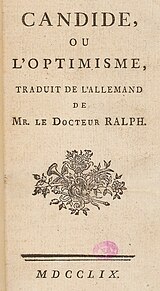 W
WCandide, ou l'Optimisme is a French satire first published in 1759 by Voltaire, a philosopher of the Age of Enlightenment. The novella has been widely translated, with English versions titled Candide: or, All for the Best (1759); Candide: or, The Optimist (1762); and Candide: Optimism (1947). It begins with a young man, Candide, who is living a sheltered life in an Edenic paradise and being indoctrinated with Leibnizian optimism by his mentor, Professor Pangloss. The work describes the abrupt cessation of this lifestyle, followed by Candide's slow and painful disillusionment as he witnesses and experiences great hardships in the world. Voltaire concludes Candide with, if not rejecting Leibnizian optimism outright, advocating a deeply practical precept, "we must cultivate our garden", in lieu of the Leibnizian mantra of Pangloss, "all is for the best" in the "best of all possible worlds".
 W
WA Case of Conscience is a science fiction novel by American writer James Blish, first published in 1958. It is the story of a Jesuit who investigates an alien race that has no religion yet has a perfect, innate sense of morality, a situation which conflicts with Catholic teaching. The story was originally published as a novella in 1953, and later extended to novel-length, of which the first part is the original novella. The novel is the first part of Blish's thematic After Such Knowledge trilogy: it thus follows Doctor Mirabilis and both Black Easter and The Day After Judgment.
 W
WThe Closing of the Western Mind: The Rise of Faith and the Fall of Reason (2003) is a book by the classical historian Charles Freeman, in which he discusses the relationship between the Greek philosophical tradition and Christianity, primarily in the fourth to sixth century AD. He argues that far from suppressing Greek philosophy, Christianity integrated the more authoritarian aspects of Platonism at the expense of the Aristotelian tradition. He explores the contribution of the Roman emperors to the definition of Christian doctrine, an argument followed up in his 2009 book AD 381. He dates "the reopening of the western mind" to the integration of Aristotle's thought into Christian doctrine by Thomas Aquinas in the thirteenth century.
 W
WContact is a 1985 hard science fiction novel by American scientist Carl Sagan. It deals with the theme of contact between humanity and a more technologically advanced, extraterrestrial life form. It ranked No. 7 on the 1985 U.S. bestseller list. The novel originated as a screenplay by Sagan and Ann Druyan in 1979; when development of the film stalled, Sagan decided to convert the stalled film into a novel. The film concept was subsequently revived and eventually released in 1997 as the film Contact starring Jodie Foster.
 W
WThe Crow Road is a novel by the Scottish writer Iain Banks, published in 1992.
 W
WThe Demon-Haunted World: Science as a Candle in the Dark is a 1995 book by the astrophysicist Carl Sagan, in which the author aims to explain the scientific method to laypeople, and to encourage people to learn critical and skeptical thinking. He explains methods to help distinguish between ideas that are considered valid science and those that can be considered pseudoscience. Sagan states that when new ideas are offered for consideration, they should be tested by means of skeptical thinking and should stand up to rigorous questioning.
 W
WA Devil's Chaplain: Reflections on Hope, Lies, Science, and Love is a 2003 book of selected essays and other writings by Richard Dawkins. Published five years after Dawkins's previous book Unweaving the Rainbow, it contains essays covering subjects including pseudoscience, genetic determinism, memetics, terrorism, religion and creationism. A section of the book is devoted to Dawkins' late adversary Stephen Jay Gould.
 W
WDialogues Concerning Natural Religion is a philosophical work by the Scottish philosopher David Hume, first published in 1779. Through dialogue, three philosophers named Demea, Philo, and Cleanthes debate the nature of God's existence. Whether or not these names reference specific philosophers, ancient or otherwise, remains a topic of scholarly dispute. While all three agree that a god exists, they differ sharply in opinion on God's nature or attributes and how, or if, humankind can come to knowledge of a deity.
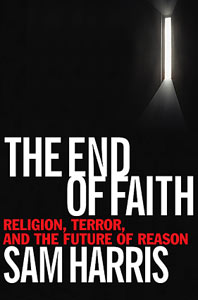 W
WThe End of Faith: Religion, Terror, and the Future of Reason is a 2004 book by Sam Harris, concerning organized religion, the clash between religious faith and rational thought, and the problem of intolerance that correlates with religious fundamentalism.
 W
WFaith Versus Fact: Why Science and Religion Are Incompatible is a 2015 book by the biologist Jerry Coyne concerning the relationship between science and religion. Coyne argues that religion and science are incompatible, by surveying the history of science and stating that both religion and science make claims about the universe, yet only science is open to the fact that it may be wrong.
 W
WThe Future of an Illusion is a 1927 work by Sigmund Freud, the founder of psychoanalysis, in which Freud discusses religion's origins, development, and its future. He provides a psychoanalysis of religion, which he views as a false belief system.
 W
WGod and the State is an unfinished manuscript by the Russian anarchist philosopher Mikhail Bakunin, published posthumously in 1882. The work criticises Christianity and the then-burgeoning technocracy movement from a materialist, anarchist and individualist perspective. Early editions contained rewrites by Carlo Cafiero and Élisée Reclus in order to make the work more poetic in the translated French and due to misreadings, but later translations have attempted to remain more faithful to the original text. It has gone on to become Bakunin's most widely read and praised work.
 W
WThe God Argument: The Case against Religion and for Humanism is a 2013 book by the English philosopher and humanist, A. C. Grayling, in which he counters the arguments for the existence of God, and puts forward humanism as an alternative to religion.
 W
WThe God Delusion is a 2006 book by English biologist Richard Dawkins, a professorial fellow at New College, Oxford, and former holder of the Charles Simonyi Chair for the Public Understanding of Science at the University of Oxford.
 W
WGod Is Not Great is a 2007 book by British-American author and journalist Christopher Hitchens, in which he makes a case against organized religion. It was originally published in the United Kingdom by Atlantic Books as God Is Not Great: The Case Against Religion and in the United States by Twelve as God Is Not Great: How Religion Poisons Everything, but was republished by Atlantic Books in 2017 with no subtitle.
 W
WGod: The Failed Hypothesis is a 2007 New York Times bestseller by scientist Victor J. Stenger who argues that there is no evidence for the existence of a deity and that God's existence, while not impossible, is improbable.
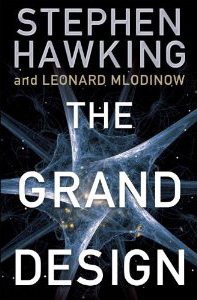 W
WThe Grand Design is a popular-science book written by physicists Stephen Hawking and Leonard Mlodinow and published by Bantam Books in 2010. The book examines the history of scientific knowledge about the universe and explains eleven-dimensional M-theory. The authors of the book point out that a Unified Field Theory may not exist.
 W
WHis Dark Materials is a trilogy of fantasy novels by Philip Pullman consisting of Northern Lights (1995), The Subtle Knife (1997), and The Amber Spyglass (2000). It follows the coming of age of two children, Lyra Belacqua and Will Parry, as they wander through a series of parallel universes. The novels have won a number of awards, including the Carnegie Medal in 1995 for Northern Lights and the 2001 Whitbread Book of the Year for The Amber Spyglass. In 2003, the trilogy was ranked third on the BBC's The Big Read poll.
 W
WAn Intelligent Person's Guide to Atheism is the first book by Daniel Harbour, an Oxford maths and philosophy graduate, who at the time of writing was working for a PhD in linguistics at MIT.
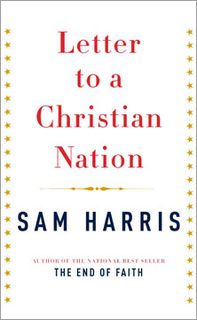 W
WLetter to a Christian Nation is a book by Sam Harris, written in response to feedback he received following the publication of his first book The End of Faith. The book is written in the form of an open letter to a Christian in the United States. Harris states that his aim is "to demolish the intellectual and moral pretensions of Christianity in its most committed forms." The book was released in September 2006. In October it entered the New York Times Best Seller list at number seven.
 W
WLetters from the Earth is a posthumously published work of celebrated American author Mark Twain (1835–1910) collated by Bernard DeVoto. It comprises essays written during a difficult time in Twain's life (1904–09), when he was deeply in debt and had recently lost his wife and one of his daughters. The content concerns morality and religion and strikes a tone that is sarcastic, Twain's own term throughout the book. Initially, another of his daughters, Clara Clemens, objected to its publication in March 1939, probably because of its controversial and iconoclastic views on religion, claiming it presented a "distorted" view of her father. Henry Nash Smith helped change her position in 1960. Clara explained her change of heart in 1962 saying that "Mark Twain belonged to the world" and that public opinion had become more tolerant. She was also influenced to release the papers by her annoyance with Soviet reports that her father's ideas were being suppressed in the United States. The papers were selected, edited and sequenced for the book in 1939 by Bernard DeVoto.
 W
WLetters to a Young Contrarian is Christopher Hitchens' contribution, released in 2001, to the Art of Mentoring series published by Basic Books.
 W
WThe Life of Mary Baker G. Eddy and the History of Christian Science (1909) is a highly critical account of the life of Mary Baker Eddy, the founder of Christian Science, and the early history of the Christian Science church in 19th-century New England. Largely ghostwritten by the novelist Willa Cather, it was published as a book in November 1909 in New York by Doubleday, Page & Company. The original byline was that of a journalist, Georgine Milmine, but it later emerged that Cather was the principal author.
 W
WThe Mores of the Russian Clergy is a book by Soviet historian of religion and advocate of atheism Yefim Grekulov, originally published in 1928.
 W
WNothing: Something to Believe in is a 2007 book by Nica Lalli that offers a personal account of atheism.
 W
WPhilosophy in the Bedroom is a 1795 book by the Marquis de Sade written in the form of a dramatic dialogue. Though initially considered a work of pornography, the book has come to be considered a socio-political drama. Set in a bedroom, the two lead characters make the argument that the only moral system that reinforces the recent political revolution is libertinism, and that if the people of France fail to adopt the libertine philosophy, France will be destined to return to a monarchic state. In the chapter titled "Fifth Dialogue", there is a lengthy section where the character Chevalier reads a philosophical pamphlet titled "Frenchmen, Some More Effort If You Wish To Become Republicans". The pamphlet clearly represents Sade's philosophy on religion and morality, a philosophy he passionately hopes the citizens of France will embrace and codify into the laws of their new republican government. Continually throughout the work, Sade makes the argument that one must embrace atheism, reject society's beliefs about pleasure and pain, and further makes his argument that if any crime is committed while seeking pleasure, it cannot be condemned.
 W
WThe Portable Atheist: Essential Readings for the Nonbeliever (2007) is an anthology edited by Christopher Hitchens. Hitchens wrote introductions to each article he compiled for the book. The main introduction is centered on an unbeliever's point of view, what he is constantly told, "and the errors incurred by religion, since the pre-history of our species, in identifying not just the wrong explanation but the wrong culprit in episodes of nightmarish ignorance and calamity".
 W
WReligion Explained: The Evolutionary Origins of Religious Thought is a 2001 book by cognitive anthropologist Pascal Boyer, in which the author discusses the evolutionary psychology of religion and evolutionary origin of religions.
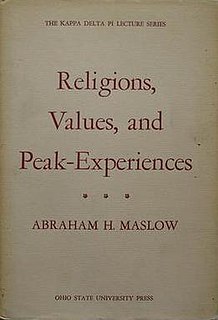 W
WReligions, Values, and Peak Experiences is a 1964 book about psychology by Abraham Maslow. Maslow addressed the motivational significance of peak experiences in a series of lectures in the early 1960s, later published these ideas in book form.
 W
WScience in the Soul: Selected Writings of a Passionate Rationalist is a book of selected essays and other writings by Richard Dawkins published in 2017.
 W
WThe System of Nature or, the Laws of the Moral and Physical World is a work of philosophy by Paul-Henri Thiry, Baron d'Holbach (1723–1789).
 W
WThis Life: Secular Faith and Spiritual Freedom is a book by philosopher Martin Hägglund, which pursues a critique of the religious ideal of eternity and reconceives faith in secular terms as the fundamental form of practical commitment. Through new interpretations of G.W.F. Hegel, Karl Marx, and Martin Luther King Jr., Hägglund develops the social and political stakes of his critique of religion, arguing that labor under capitalism alienates us from our finite lifetime. Calling for a revaluation of our values, Hägglund presents a novel vision of democratic socialism as a post-capitalist form of life in which we could truly own our time and recognize our shared freedom.
 W
WWritten by the Dutch philosopher Benedictus Spinoza, the Tractatus Theologico-Politicus (TTP) or Theologico-Political Treatise was one of the most controversial texts of the early modern period. In it, Spinoza expounds his views on contemporary Jewish and Christian religion and critically analyses the Bible which underlies both. He argues what the best roles for state and religion should be and concludes that a degree of democracy and freedom of speech and religion works best, like in Amsterdam, while the state remains paramount within reason. The goal of the state is to guarantee the freedom of the citizens. Religious leaders should not meddle in politics. Spinoza prepares the ground for his work on metaphysics and psychology Ethics, published posthumously in 1677, for which he anticipated harsh criticism.
 W
WThe Transcendental Temptation: A Critique of Religion and the Paranormal is a 1986 book by the philosopher Paul Kurtz. The book was published by Prometheus Books, a company founded by Kurtz in 1969.
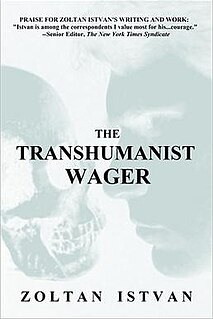 W
WThe Transhumanist Wager is a 2013 science fiction novel by American author Zoltan Istvan. The novel follows the life of Jethro Knights, a philosopher whose efforts to promote transhumanism ultimately lead to a global revolution. It was a first place winner in visionary fiction at the International Book Awards.
 W
WThe Varieties of Scientific Experience: A Personal View of the Search for God is a book collecting transcribed talks on the subject of natural theology that astronomer Carl Sagan delivered in 1985 at the University of Glasgow as part of the Gifford Lectures. The book was first published posthumously in 2006, 10 years after his death. The title is a reference to The Varieties of Religious Experience by William James.
 W
WWaking Up: A Guide to Spirituality Without Religion is a 2014 book by Sam Harris that discusses a wide range of topics including secular spirituality, the illusion of the self, psychedelics, and meditation. He attempts to show that a certain form of spirituality is integral to understanding the nature of the mind. In late September 2014, the book reached #5 on the New York Times Non-Fiction Best Sellers list.
 W
WWe the Living is the debut novel of the Russian American novelist Ayn Rand. It is a story of life in post-revolutionary Russia and was Rand's first statement against communism. Rand observes in the foreword that We the Living was the closest she would ever come to writing an autobiography. Rand finished writing the novel in 1934, but it was rejected by several publishers before being released by Macmillan Publishing in 1936. It has since sold more than three million copies.
 W
WWhen Religion Becomes Evil is a book by Baptist minister Charles Kimball, published in 2002. Kimball is a Professor in the Department of Religion at Wake Forest University and also an Adjunct Professor in the Wake Forest Divinity School. In 2008, he became director of Religious Studies at the University of Oklahoma. Kimball specialises in Islamic Studies.
 W
WWhit, or, Isis amongst the unsaved is a novel by the Scottish writer Iain Banks, published in 1995. Isis Whit, a young but important member of a small, quirky cult in Scotland, narrates. The community suspects that Isis' cousin Morag is in danger, and sends Isis out to help.
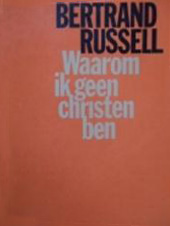 W
WWhy I Am Not a Christian is an essay by the British philosopher Bertrand Russell. Originally a talk given 6 March 1927 at Battersea Town Hall, under the auspices of the South London Branch of the National Secular Society, it was published that year as a pamphlet and has been republished several times in English and in translation.